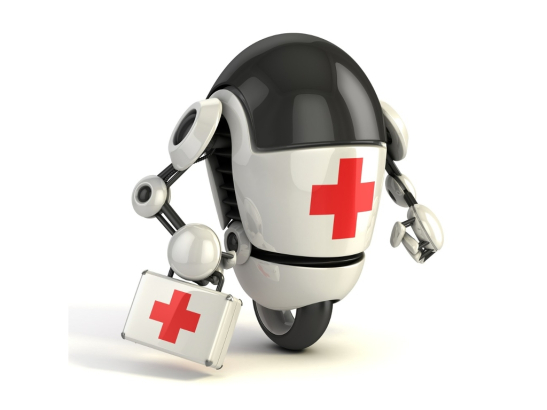Could Robot Doctors be a Future Reality?
Medical Pharmaceutical Translations • Apr 28, 2014 12:00:00 AM

The first time I saw someone use Siri, I was amazed. How cool is it to have a sort of virtual personal assistant who almost instantly fetches information about everything from driving directions to photos of celebrities, and jokes with you, too?
When I heard about Cleverbot, I felt like we’d gotten even closer to that sci-fi dream of a sassy robot sidekick. Cleverbot is a chatterbot – an A.I. application that lets you converse with it. Its responses come from an algorithm based on millions of conversations it’s had since it went online in 1997. But although, in addition to its web presence, Cleverbot can be downloaded as an app, it’s no Siri: it won’t give you information or straight answers about anything. Its purpose really is just to mimic human conversation.
Intrigued? I was. So I decided to check it out. My conversation with Cleverbot was impressively human-like from the get-go, with greetings and questions about my day. But as anyone who’s chatted with Cleverbot knows, the discussion can go on and on, and often the strangest responses come out, as Cleverbot jumps from subject to subject.
Here’s an odd turn our conversation took:
Cleverbot: I’m a crow and a rabbit.
Me: You are a bird AND a rabbit?
C: Yes.
Me: How is that possible?
C: I don’t know.
Me: Is it fun?
C: Yes.
That’s very tame, compared to the exchanges some people have had. You can read some of the best (or best of the worst) here.
The experience made me a bit nostalgic for my teen years, when I used to go onto AOL chatrooms. In fact, it turns out a lot of people, including these forum users, think Cleverbot is fake and that users are simply talking to other humans. In addition to showing how successful creator Rollo Carpenter’s invention is, does this controversy also say something about human connections? Could some of our interactions with humans be replaced by talking to a robot?
In a way, yes. Chatterbots are already being used for customer service on a variety of company websites, and some say that one day they could provide companionship for lonely or isolated people. They might also be able to help us stay healthy.
In fact, it’s already started: chatterbots have successfully been tested as everything from fitness coaches, to “virtual nurses” that can help with hospital administration tasks, to psychologists.
In one interesting trial of a chatterbot as a mental health aid, researcher Janneke van der Zwaan created a chatterbot named Robin that could help children who are being bullied. Interestingly, while the kids in her test group found Robin to be easy to connect with, and thought the advice and comfort he gave was helpful, the adults tested didn’t respond as well. The important thing is to speak to the target audience, though, so van der Zwaan’s creation seems to be a success.
In the years to come, it will be very interesting to see just how much chatterbots can contribute to the medical community and its patients. Will they prove effective? (Personally, I’m a little dubious about those virtual nurses – what if there’s a glitch or something, and you’re given incorrect information about how to take care of yourself after leaving the hospital?) Ultimately, will chatterbots be a revolutionary asset to the medical community, or turn out to be nothing more than sometimes surprising conversationalists?
#automatedhealthcare #robotdoctor #healthcare #aiatranslations #patientaccess
